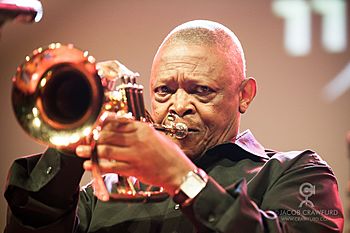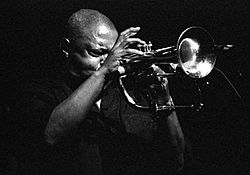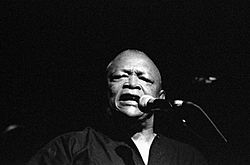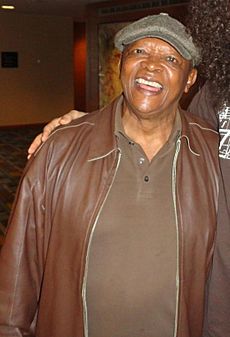Hugh Masekela facts for kids
Quick facts for kids
Hugh Masekela
|
|
|---|---|

Masekela performing in 2011
|
|
| Born |
Hugh Ramapolo Masekela
4 April 1939 Emalahleni, Union of South Africa
|
| Died | 23 January 2018 (aged 78) Johannesburg, South Africa
|
| Occupation |
|
| Years active | 1956–2018 |
| Children | Selema Masekela |
| Relatives | Barbara Masekela (sister) |
| Musical career | |
| Genres |
|
| Instruments |
|
| Labels |
|
| Associated acts |
|
Hugh Ramapolo Masekela (born April 4, 1939 – died January 23, 2018) was a famous South African musician. He played the trumpet, flugelhorn, and cornet. He was also a singer and composer. Many people called him "the father of South African jazz."
Masekela was famous for his jazz music. He also wrote popular songs that spoke out against apartheid. Apartheid was a system of unfair rules in South Africa. Songs like "Soweto Blues" and "Bring Him Back Home" are examples. In 1968, his song "Grazing in the Grass" became a number-one hit in the United States.
Contents
Early Life and Music Beginnings
Hugh Ramapolo Masekela was born in a township called KwaGuqa. This was in Witbank, South Africa. His father, Thomas Masekela, was a health inspector. His mother, Pauline Masekela, was a social worker. His younger sister, Barbara Masekela, became a poet and activist.
As a child, Hugh loved to sing and play the piano. His grandmother mostly raised him. She ran a small, unofficial bar for miners. When Hugh was 14, he watched a movie called Young Man with a Horn. This movie made him want to play the trumpet.
Archbishop Trevor Huddleston helped Hugh get his first trumpet. Huddleston was a chaplain who was against apartheid. He asked a band leader, Uncle Sauda, to teach Hugh. Hugh learned very quickly. Soon, other students wanted to play instruments too. They formed the Huddleston Jazz Band. This was South Africa's first youth orchestra. When Louis Armstrong, a famous American trumpeter, heard about the band, he sent Hugh one of his own trumpets as a gift.
By 1956, Hugh joined the African Jazz Revue. He played music that showed his life experiences. The struggles and joys of South Africa inspired him. His music spoke out against apartheid and unfairness. He wanted his music to help bring about change.
In 1958, Masekela joined the orchestra for the musical King Kong. This musical was a huge success in South Africa. It toured the country and even went to London.
Music Career and Activism
In late 1959, Hugh and some friends formed the Jazz Epistles. This was the first African jazz group to record a full album. They played to huge crowds in Johannesburg and Cape Town.
However, things changed after the Sharpeville massacre in 1960. Many protestors were killed. The South African government made strict new rules. Because of this, Masekela left the country. Friends like Trevor Huddleston helped him. He went to study music in London. Then he moved to the United States. He studied classical trumpet in New York from 1960 to 1964. In 1964, he married singer Miriam Makeba, but they divorced two years later.
Big Hits and Important Collaborations
Masekela had big hits in the US. These included "Up, Up and Away" in 1967. His song "Grazing in the Grass" became a number-one hit in 1968. It sold four million copies! He also performed at the Monterey Pop Festival in 1967.
In 1974, Masekela helped organize the Zaire 74 music festival. This event happened around a famous boxing match. He also played with famous bands like the Byrds and Paul Simon. In 1984, his song "Don't Go Lose It Baby" was very popular on dance charts.
In 1987, he released "Bring Him Back Home". This song became an anthem for the movement to free Nelson Mandela. Mandela was a leader who was imprisoned for fighting apartheid.
Hugh also became very interested in his African roots again. He worked with musicians from West and Central Africa. He even set up a music studio in Botswana. This was close to the South African border. He used a music style called mbaqanga in his songs. He continued this style when he returned to South Africa in the 1990s.
In 1985, Masekela started the Botswana International School of Music. This school still holds an annual music camp. It helps local musicians learn and play together.
In the 1980s, Masekela toured with Paul Simon for his Graceland album. Other South African artists like Ladysmith Black Mambazo were also part of this tour. Masekela also helped create music for the Broadway play Sarafina! in 1988.
In 2003, he was in a documentary film called Amandla!: A Revolution in Four-Part Harmony. In 2004, he wrote his life story, Still Grazing: The Musical Journey of Hugh Masekela. This book talked about his fight against apartheid.
In 2006, a history professor called Masekela "the father of African jazz." In 2010, Masekela and his son, Selema Masekela, were in a TV series for ESPN. It was called Umlando – Through My Father's Eyes. They traveled through South Africa. Hugh showed his son the places where he grew up.
In 2016, Masekela and Abdullah Ibrahim performed together. It was their first time playing together in 60 years. They reunited the Jazz Epistles to remember the 1976 Soweto uprising.
Helping Others
Masekela was involved in many social projects. He was a director for the Lunchbox Fund. This group gives a daily meal to students in township schools in Soweto.
Personal Life and Passing
Hugh Masekela was married several times. His first wife was singer Miriam Makeba. He later married Chris Calloway, Jabu Mbatha, and Elinam Cofie. In his last years, he lived with dancer Nomsa Manaka. His son, Sal Masekela, is an American television host. His younger sister is Barbara Masekela.
Hugh Masekela passed away in Johannesburg on January 23, 2018. He was 78 years old and had prostate cancer.
Awards and Recognitions
Masekela received many awards for his music and activism. On April 4, 2019, Google Doodle honored him on what would have been his 80th birthday. The Doodle showed him playing his flugelhorn.
Grammy Awards
Masekela was nominated for a Grammy Award three times:
- In 1968, for his song "Grazing in the Grass".
- In 1989, for the musical Sarafina! The Music Of Liberation.
- In 2012, for his album Jabulani.
Other Honours
- Rhodes University: Doctor of Music (2015)
- University of York: Honorary Doctorate in Music (2014)
- Order of Ikhamanga: A high South African honor (2010)
- Ghana Music Awards: African Music Legend award (2007)
- Channel O Music Video Awards: Lifetime Achievement Award (2005)
- BBC Radio Jazz Awards: International Award of the Year (2002)
- Nominated for a Tony Award for Best Score for Sarafina! (1988)
- MTV Africa Music Awards (MAMAs): Legend Award (2016)
Images for kids
See also
 In Spanish: Hugh Masekela para niños
In Spanish: Hugh Masekela para niños
 | Aurelia Browder |
 | Nannie Helen Burroughs |
 | Michelle Alexander |








